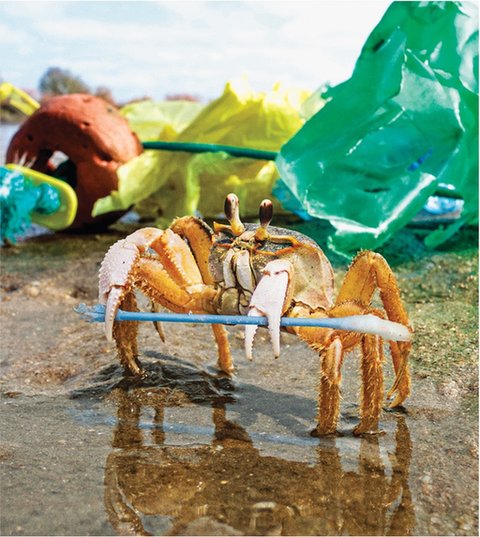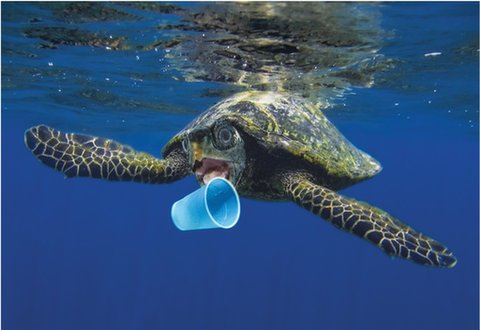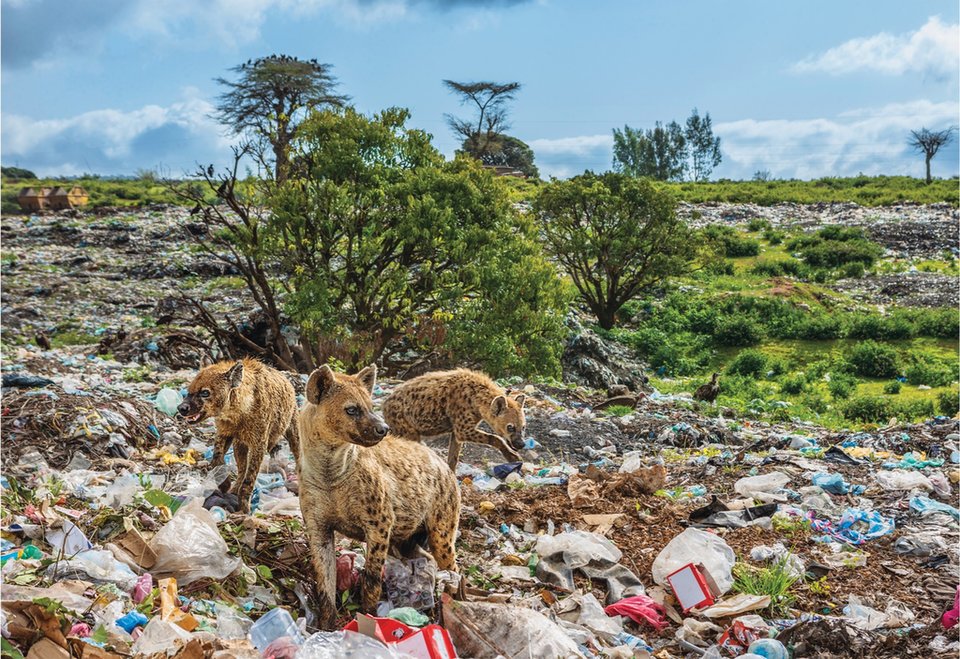
Acrabclutchesacottonswabitfoundona beach.
DangertoAnimals
Whileoceanplasticchokesourwaters,it’skillingmillionsofmarineanimalseveryyear.Nearly700 species,includingendangeredones,areknowntohavebeenaffectedby it.
Someareharmedvisibly.Theyarestrangledbyabandonedfishingnetsordiscardedsix‑packrings.Seaturtlesandtoothedwhalesgulpdownplasticbags.Theythinktheplasticisajellyfishorsquid.Youngbirdslikealbatrosshavebeenfounddead,theirstomachsfullofplastic garbage.
Manymoreanimalsareprobablyharmedinvisibly.Marinespeciesofallsizes,fromzooplanktontowhales,noweatmicroplastics.Microplasticsaresmallplasticpieceslessthanfive millimeters(one‑fifthofaninch)long.Animalseatthemwithoutknowing it.

Aseaturtlesetsitssightsonaplastic cup.
Seabirdsscoopupfloatingplasticpellets,whichcanresemblefisheggs.Parentbirdsthenregurgitatetheplastictofeedtheiryoung.Plasticdoesn’tprovideenergyornutrients.Instead,itslowlykills animals.
Incrabs,microplasticsremaininthegutsixtimeslongerthanfooddoes.Thecrabseat,butcan’tgetenoughnutritiontosurvive.What’smore,eatingplasticcausessomespeciestostorelessfat,protein,andcarbohydrates.Whenapredatorlikeabirdeatsamarineworm,thebirdgetsalessnutritiousmeal.Italsogetstheplasticthatwormhaseaten.That’showplasticpassesupthefood chain.

EvenhyenasencounterplasticastheyscavengealandfillinEthiopia,acountryin Africa.
LookingfortheSource
Howdowekeepplasticoutofourocean?First,weneedtounderstandhowit’sgettingthereinthefirstplace.Today,weproducemoreplasticwastethanwecandispose of.
“Thisisn’taproblemwherewedon’tknowwhatthesolutionis,”saysTedSiegler.He’saresourceeconomistwhohasspentmorethan25yearsstudyinggarbage.“Weknowhowtopickupgarbage.Therealityis,wejustneedtocollectthetrash.MostcountriesthatIworkin,youcan’tevengetitoffthestreet.Weneedgarbagetrucksandhelpinstitutionalizingthefactthatthiswasteneedstobecollectedonaregular basis.”
Therearetwomainwayswecanbegintotacklethetrashandplasticsproblem,accordingtoSiegler.First,wecandesignnewplasticsandnewplasticproductsthatareeitherbiodegradableormore recyclable.
Second,wecanbuildbetterwasteremovalsystemsincountriesthatneedmorehelp.Sieglerevensuggestsaworldwidetax.Companieswouldpayapennyoneverypoundofplasticthey manufactured.
Thetaxwouldraiseroughlysixbilliondollarsayear.Thatmoneycouldbeusedtobuildandmanagegarbagecollectionsystemsindeveloping nations.
